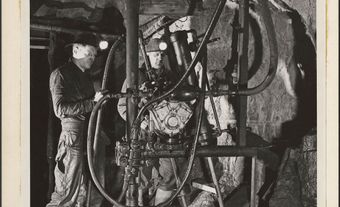This article was originally published in Maclean's Magazine on December 15, 1997
Postal Strike Ends
At Golfinn International's offices in Brampton, Ont., Dave Finn is busily scratching numbers on a notepad, trying to arrive at some reasonably accurate estimate of the damage. "We were losing between $10,000 and $15,000 a day," says the president of Canada's only mail-order golf equipment supply business, "so I guess that means the postal strike probably cost us $130,000, maybe $140,000 in lost sales." For Finn's seven-year-old company, with annual revenues of around $1 million, losses of that magnitude are significant, severe enough to force the layoff of seven of the firm's 17-member staff and to diminish - if not completely eradicate - hopes for much of a profit this year. Still, Finn counts himself lucky. "We're a little battered and bruised," he acknowledges, "but at least we survived."
Not everyone did. While there is still no list of the casualties in the nationwide postal strike that finally came to an end last week, early reports suggest that the 15-day walkout by the 45,000 members of the Canadian Union of Postal Workers did help to push a few businesses over the brink. "A lot went under," declares Catherine Swift, president of the Canadian Federation of Independent Business. Exactly how many, nobody seems to know at the moment. But Swift points to a survey conducted during the strike indicating that 63 per cent of the CFIB's 88,000 members were experiencing "major cash-flow problems" as a direct result of the dispute between Canada Post and its employees. "Many of our members were having real problems meeting payrolls," says Swift.
Even for those who managed to weather the storm, the picture is bleak. John Gustavson, president of the Canadian Direct Marketing Association (CDMA), estimates that the strike put 10,000 Canadians out of work, cost Canadian business $40 million a day in lost sales and Canadian charities another $10 million daily in lost donations. "Multiply $50 million a day by the 11 working days the strike lasted," argues Gustavson, "and you end up with a countrywide economy that has been damaged to the tune of roughly half-a-billion dollars."
If the strike had resolved anything, it might be easier for most Canadians to accept the hurt. The fact remains, however, that management and workers at Canada Post were not able to reach agreement on any of their many differences, despite negotiations that began last August. Even the best efforts of two government-appointed conciliators and a mediator proved futile. In the end, Ottawa had to resort to legislation to force CUPW's strikers back to work under terms that are likely to further sour the already poisonous atmosphere at the Crown corporation. As CUPW official Catherine Louli bitterly remarked: "It just means another strike in the year 2000."
Union officers were particularly irked by the wage settlement the government chose to impose as part of the back-to-work legislation (it breezed through the House of Commons in a single day last week, endorsed by a final vote of 198 to 56 with only Bloc Québécois and New Democratic Party MPs opposed). Under the terms of the package, postal workers, whose base pay is now $17.41 an hour, will receive a 1.5-per-cent salary hike this coming February, another 1.75 per cent the following February and a final 1.9 per cent in February, 2000.
The imposed settlement is not only far distant from the 8.6-per-cent increase over two years CUPW was seeking, but is even marginally less than the offer Canada Post had on the bargaining table when talks finally collapsed. That called for annual increases over the next three years of 1.5, 1.75 and two per cent. What is more, management's offer would have commenced last August. "It amounts to an average loss per worker of $991 over three years," complained CUPW director of research Geoff Bickerton. "I can think of only one reason the government acted as it did - pure vindictiveness, payback time for the workers."
For the record, the government denies the charge. Both Labor Minister Lawrence MacAulay and Public Works Minister Alfonso Gagliano, under repeated questioning in the Commons, continually described the settlement as "fair." But the fact that the government chose to undercut even Canada Post's offer puzzled many, lending weight to criticism of the government's entire handling of the dispute. "They were reactive rather than proactive," claimed Reform's House Leader Randy White. "They knew this was coming for a long time, yet they had no strategy. Then they stand up and say they want to legislate back to work to help small business. But they are more interested in their media image than in small business."
NDP Labor critic Patrick Martin also claimed the Liberals mismanaged the crisis. He points in particular to the "strategic mistake" Gagliano made last summer when he promised CDMA president Gustavson that postal employees would be quickly legislated back to work in the event of a strike. In Martin's view, when news of Gagliano's promise to Gustavson surfaced, it undermined the collective bargaining process, giving Canada Post no incentive to adopt a flexible negotiating stance - and making back-to-work legislation inevitable.
CUPW's leadership shares the opinion. Union president Darrell Tingley, in fact, chose last week to portray Gagliano - whose portfolio includes responsibility for the post office - and the CDMA as "the main enemies" of postal workers. In a news conference, he darkly predicted that the CDMA's Gustavson will "pay a heavy price" for his role in recent months, mentioning the prospect of regular union visits to the CDMA president's office and home. At the same time, he warned corporate Canada that a massive backlog of mail waiting to be processed could lead to errors. "I don't know where their mail will go," he said. "Something supposed to go to Vancouver could end up in Taiwan."
Gustavson dismissed the accusations, as well as the veiled threats. "I think the vast majority of postal workers are professionals, who will continue to do their job in a professional manner," he told Maclean's, while denying having played any role, covert or otherwise, in negotiations between management and workers at Canada Post. The now-infamous memo he wrote to the CDMA's membership last summer, which revealed Gagliano's promise, contained, according to Gustavson, "nothing that the minister himself had not already publicly stated."
Whatever the accuracy of that statement, the mail was once again moving last week, even if there were a few isolated incidents - including damage inflicted on postal delivery trucks - that marred the return to work of the country's posties. But as the letters and the bills started to flow, all of those hurt by Canada's latest postal strike - the first in six years - began tallying the losses. Charities were among the hardest hit. "The strike could not have happened at a worse time for us," said Jerry Seligman, Toronto-based director of Canadian marketing for the United Nations International Children's Emergency Fund, as he pointed out that "75 per cent of UNICEF's revenues in this country are collected during November and December." Christmas card sales at the organization's 25 retail outlets are down by between 20 and 30 per cent, as are responses to UNICEF's two Christmas catalogues. "A 25-per-cent drop will eventually translate into the loss of $1 million," said Seligman. "About $500,000 of that would have gone to a number of children's emergency programs."
Similarly, Kenneth Maybee, executive director of the New Brunswick Lung Association, reported that his organization's Christmas Seal drive is currently $100,000 short of last year's figure of $234,000. Nationwide, the association has collected $2 million less than the $11 million collected last year. "Unless Christmas Seal sales pick up now that the strike is over," predicted Maybee, "we're not looking good."
In an effort to aid beleaguered charities, Prime Minister Jean Chrétien last week accepted a suggestion from Conservative Leader Jean Charest to extend by one month - until the end of January - the period allowed to claim charitable tax deductions. There are, however, no similar breaks in store for those who have fallen victim to the country's latest postal strike. They are people like Dave Finn, who has heard "enough angry rhetoric" for the time being. "I just want to get my business going," says Finn, "hire my people back." It's a sentiment that many other Canadians undoubtedly share.
Maclean's December 15, 1997

 Share on Facebook
Share on Facebook Share on X
Share on X Share by Email
Share by Email Share on Google Classroom
Share on Google Classroom


